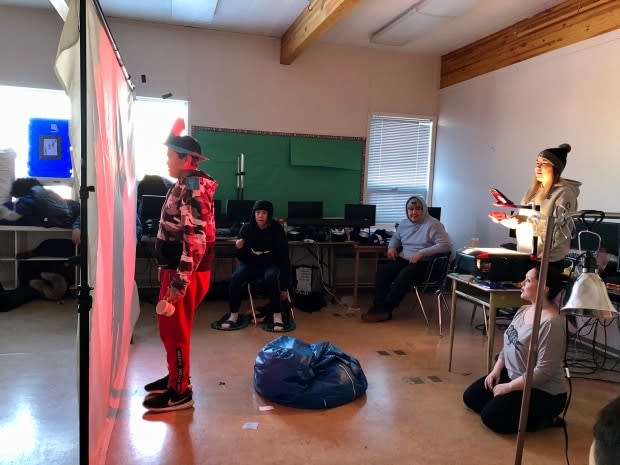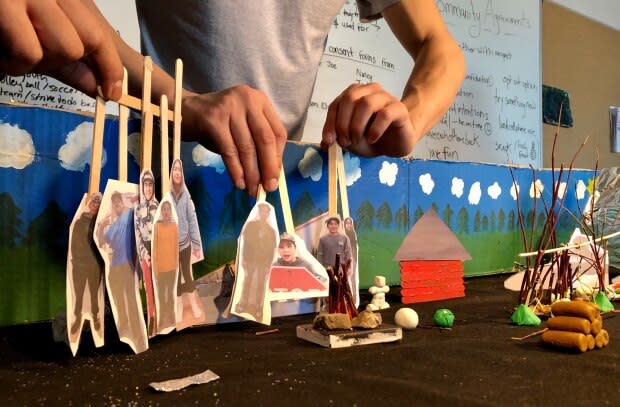How art is helping N.W.T. teens learn about drugs, alcohol and wellness

A projector casts light onto a large white sheet in a classroom at Moose Kerr School in Aklavik, N.W.T.
Behind it, students re-enact the story of Aklavik's infamous Mad Trapper while other students film the scene.
The fugitive's story comes to life in shadows.
This doesn't look or feel like a health lesson, but between building props and learning lines, the students are asking questions and having conversations about vaping, marijuana and alcohol and how to cope with stress in their lives.
"These aren't easy conversations to have," said Alana Kronstal, manager of social marketing for the N.W.T.'s Department of Health and Social Services. "Using art as a way to explore all these things has been really effective."
The Dope Experience is an arts-based health education workshop that was developed by the territory's Health Department in consultation with youth and elders for the N.W.T.
The initiative costs more than $1 million, and is partially funded by Health Canada through funds related to cannabis legislation. There will be workshops in more than two-thirds of the N.W.T.'s 33 communities.

Two territorial non-profit organizations — Western Arctic Moving Pictures and the NWT Association of Communities — are delivering the workshops.
"We heard loud and clear that [youth] really want hands-on opportunities to come together and that they wanted to be exposed to healthy alternatives as well as talking about the hard stuff," said Kronstal.
Positive tools help resist substance use
The workshops are run by facilitators with backgrounds in media, music and art. They spend one week in each community.
Groups of students range from six to 25 participants, depending on the size of the community. The workshops are for students in Grade 7 and higher, but they have been tailored for students as young as Grade 3.
Students do stop-motion photography with clay, digital storytelling and shadow plays that focus on local history and culture.

"Re-enacting the Mad Trapper is one way for us … to be proud of our communities and the stories and the history and a way for people to connect," said Jeremy Emerson, a filmmaker and a workshop facilitator.
Making connections and showing resiliency though art, he said, can help youth in their daily lives.
"These are positive sort of tools for people and youth to use that, you know, can help them resist using substances when they feel overwhelmed or dealing with emotions or stress."
Each day, the facilitators answer questions from an anonymous box. The content and discussions are driven by what the students want to learn.
"They all know that they can come to us," said Emerson.
Watch the Dope Experience:
'I really enjoy this'
Philip Elanik, 19, says this informal approach is working for him.
"[It's a] really good self-esteem booster," he said. "We get some answers where you're comfortable with your peers and with your classmates and able to talk and open up."

Petra Arey, 17, says the workshops are an easier way to get information.
"I really enjoy this. This workshop I guess you could say, it's a lot of fun," she said.
Youth 'surprisingly receptive'
The project only has enough funding to hold workshops in each community once.
Kronstal says the department hopes to secure more funding to offer similar programming, but on a smaller scale.
The workshops are just one way to support youth, she said.
"The social determinants of health are real. We have to be supporting youth from all fronts in order to ensure that they have the best chance at life and have that information at their fingertips when they need it," she said.
Youth who typically haven't been engaged in the education system have been "surprisingly receptive" and coming out in numbers that's surprising administrators, said Kronstal.
At the end of each workshop, the students share their projects with the community and online.
"We're hearing from communities that it's been really meaningful," she said.

